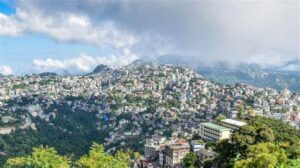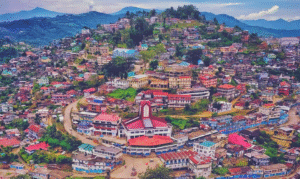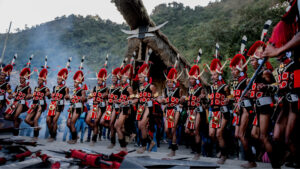Loktak Lake, located in the northeastern part of India, is a natural wonder that is both breathtaking and culturally significant. This lake, situated in the state of Manipur, is renowned for its unique feature—the phumdis. These floating islands are a rare phenomenon found only in a few places around the world, making Loktak Lake one of the most fascinating natural sites in India. In this article, we will dive deep into the history, culture, and ecological importance of Loktak Lake, and explore how this natural wonder influences the local community.
Historical Roots of Loktak Lake
Loktak Lake has a rich history that stretches back for centuries. It is believed that the lake was formed millions of years ago as a result of tectonic movements. Over time, the lake has become an important part of the cultural and economic life of the people of Manipur. The lake and its phumdis have witnessed the rise and fall of civilizations, making them an integral part of the region’s historical heritage.
The name “Loktak” comes from the Manipuri language, where “Lok” means “stream” and “Tak” means “lake.” The lake has been a source of water, livelihood, and spiritual significance for the local people for generations. It is a place of deep cultural importance, and many historical events have unfolded around it.
Language and Communication Around Loktak Lake
In the region around Loktak Lake, the primary language spoken is Manipuri, also known as Meitei. The local language plays a crucial role in maintaining the cultural identity of the people. Most of the folklore, songs, and traditions of the area are passed down orally in Manipuri.
Communication in this region is deeply intertwined with nature. For example, many words and expressions are inspired by the lake and its surroundings. The floating phumdis, for instance, are often referenced in the local language as symbols of resilience and adaptability, reflecting the harmony between the people and the land.
Festivals and Celebrations Near Loktak Lake
Loktak Lake is a focal point for many local festivals and celebrations. One of the most important festivals celebrated in Manipur is Yaoshang, a festival that marks the beginning of the spring season. During this time, people gather near the lake to participate in various cultural activities, including dances, music performances, and traditional games.
Another significant festival is Cheiraoba, the Manipuri New Year, which is celebrated with great enthusiasm. The lake becomes a vibrant hub of cultural expression, as people come together to celebrate their connection with nature, spirituality, and community.
Arts, Crafts, and Music of Loktak Lake
The people living around Loktak Lake are known for their rich artistic traditions. Manipuri dance, music, and crafts have deep roots in the culture of this region. Manipuri dance, known for its graceful movements and spiritual themes, is performed during many festivals and special occasions.
In addition to dance, the locals are skilled in creating intricate handicrafts, particularly handwoven textiles and bamboo crafts. The arts and crafts of Manipur reflect the deep connection between the people and their environment, with many designs inspired by the natural beauty of Loktak Lake and its unique floating islands.
Cuisine and Culinary Traditions
The cuisine of Manipur is distinct and flavorful, with a focus on fresh, locally sourced ingredients. The people of Loktak Lake rely heavily on fish, which they catch from the lake, as a central component of their diet. One of the most popular dishes is Eromba, a spicy mix of mashed vegetables and fermented fish.
The culinary traditions of the region also feature rice as a staple, often served with fish curry or fermented soybeans. The flavors are bold and earthy, and the use of local herbs and spices makes Manipuri cuisine unique to the region.
Attire and Ornamentation of the Locals
Traditional attire in the region around Loktak Lake is simple yet elegant. Women typically wear Phanek, a type of skirt, paired with a top called Innaphi. Men wear Mekhela, a type of dhoti, along with a long shirt. Both men and women adorn themselves with traditional jewelry, which includes intricate silver designs that hold cultural significance.
The clothing is often made from handwoven fabrics, showcasing the region’s deep-rooted tradition of textile craftsmanship. These garments are worn during festivals, weddings, and important cultural events, representing the pride and identity of the Manipuri people.
Beliefs and Values of the People
The people around Loktak Lake hold a deep spiritual connection to the natural world. They believe that the lake is a sacred site, with many local deities associated with the water and its resources. The belief in the power of nature is reflected in their daily lives and practices.
Many communities in the area also practice Vaishnavism, a form of Hinduism that emphasizes devotion to Lord Krishna. Temples dedicated to Lord Vishnu are found near the lake, and rituals and prayers are often performed to seek blessings for the wellbeing of the people and the lake itself.
Customs and Etiquette in Loktak Lake’s Culture
The culture around Loktak Lake is marked by hospitality and respect for tradition. When visiting homes, guests are often greeted with warmth and offered local food and beverages. It is customary to remove shoes before entering someone’s home or sacred space.
Respect for nature is a key value, and the people believe in living in harmony with the environment. This respect extends to the lake, where fishing practices are carefully regulated to ensure the lake’s ecological balance is maintained.
Architecture and Symbols Around Loktak Lake
The architecture of the region is influenced by the natural surroundings. Traditional houses are often built using bamboo, thatch, and other locally sourced materials. Many houses are elevated on stilts to protect against flooding, especially during the monsoon season.
The people of the region also create symbolic structures, such as small shrines and temples, dedicated to deities associated with the lake. These structures are often simple yet reflect the spiritual relationship between the community and the environment.
Oral Traditions and Storytelling in Manipur
The oral tradition of Manipur is rich and diverse, with storytelling being an integral part of the culture. Elders pass down stories of their ancestors, the creation of the lake, and the legends surrounding the phumdis. These stories are not only meant to entertain but also to teach moral values and preserve the history of the community.
Interactions with Nature: The Phumdis of Loktak Lake
One of the most unique features of Loktak Lake is the presence of phumdis—floating islands of soil, vegetation, and organic matter. These phumdis are a rare phenomenon and play a crucial role in the ecology of the lake. They provide habitats for a variety of birds, fish, and other wildlife, and are essential to the local ecosystem.
The people of Loktak Lake have a deep understanding of the lake’s ecology. They interact with the phumdis in sustainable ways, using them for fishing and farming without causing harm to the environment. This balanced relationship with nature is a model of sustainable living.
Challenges and Preservation of Loktak Lake
Despite its beauty and importance, Loktak Lake faces several challenges, including pollution, encroachment, and climate change. The expansion of urban areas around the lake has led to a decrease in the size of the phumdis and a decline in the water quality.
Efforts are being made to preserve the lake, including government initiatives and local conservation projects. The community is also actively involved in protecting the lake through sustainable fishing practices and environmental awareness campaigns.
Contributions to Society and Connection to Northeast India
Loktak Lake is not just a local treasure; it is a symbol of the resilience and harmony of the people of Northeast India. The lake has contributed to the cultural, economic, and ecological life of the region. Its significance extends beyond Manipur, connecting the diverse cultures of Northeast India through shared values and traditions.
Preserving Loktak Lake for Future Generations
Loktak Lake is a precious natural and cultural heritage that needs to be preserved for future generations. By supporting sustainable practices, respecting local traditions, and raising awareness about environmental challenges, we can help protect this unique ecosystem.






